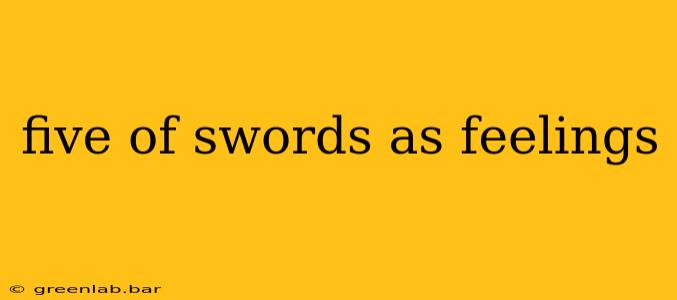The Five of Swords in tarot often depicts a scene of bitter victory, a triumph achieved through aggression and a disregard for others' feelings. When this card appears in a reading related to emotions, it points to a complex and often painful internal landscape. Understanding its nuances is key to navigating the challenging feelings it represents.
Key Emotional Manifestations of the Five of Swords
The Five of Swords as feelings doesn't represent a single, simple emotion. Instead, it's a cocktail of complex sentiments, often intermingled and difficult to untangle. Here are some of the key emotional experiences associated with this card:
1. Bitter Resentment and Regret:
This is arguably the most prominent emotion linked to the Five of Swords. It speaks to feelings of regret over actions taken, words spoken, or opportunities missed due to conflict or a competitive spirit. You might be dwelling on past arguments, feeling the sting of hurtful words, or agonizing over choices that caused harm to yourself or others. This isn't just sadness; it's a deep, gnawing resentment fueled by the knowledge that you could have acted differently.
2. Guilt and Shame:
The aggressive nature of the Five of Swords often leads to feelings of guilt and shame. You might be wrestling with the weight of your actions, particularly if they involved betrayal, manipulation, or causing unnecessary pain. This guilt can be paralyzing, making it difficult to move forward and hindering self-compassion.
3. Anger and Frustration:
While regret and guilt are prominent, the Five of Swords can also manifest as raw anger and frustration. This anger might be directed inward, fueling self-criticism and resentment, or outward, leading to further conflict and strained relationships. The frustration stems from a feeling of powerlessness, a sense that things didn't go your way and that you were unfairly treated.
4. Isolation and Loneliness:
The aftermath of conflict often leads to isolation. The Five of Swords can signify feelings of loneliness and disconnection stemming from damaged relationships or a perceived lack of support. You might feel like you've pushed people away or that nobody truly understands what you're going through.
5. Defensiveness and Justification:
Ironically, alongside feelings of guilt and regret, the Five of Swords can also manifest as defensiveness and a need to justify your actions. You might be trying to rationalize your behavior, minimizing the harm caused or blaming others for your actions. This defensiveness is a coping mechanism, a way of avoiding the pain of confronting the true impact of your choices.
Navigating the Emotional Landscape of the Five of Swords
Experiencing the emotions associated with the Five of Swords is challenging, but it’s crucial to remember that these feelings are temporary. Here are some steps to help you navigate this difficult emotional terrain:
- Acknowledge and Accept: The first step is acknowledging these difficult feelings without judgment. Allow yourself to feel the regret, guilt, and anger without trying to suppress or ignore them.
- Take Responsibility: While it's important to understand the context, avoid dwelling on external factors. Focus on taking responsibility for your actions and their consequences.
- Seek Reconciliation (if appropriate): If the conflict involves others, consider seeking reconciliation or amends. A sincere apology can go a long way in healing damaged relationships.
- Practice Self-Compassion: Be kind to yourself. Remember that everyone makes mistakes, and learning from them is part of personal growth.
- Focus on Forgiveness: Forgiveness, both of yourself and others, is a crucial step in moving on. Holding onto resentment only prolongs the pain.
The Five of Swords as feelings is a powerful message urging self-reflection and personal growth. By understanding and processing these challenging emotions, you can pave the way for healing and a more positive future.

